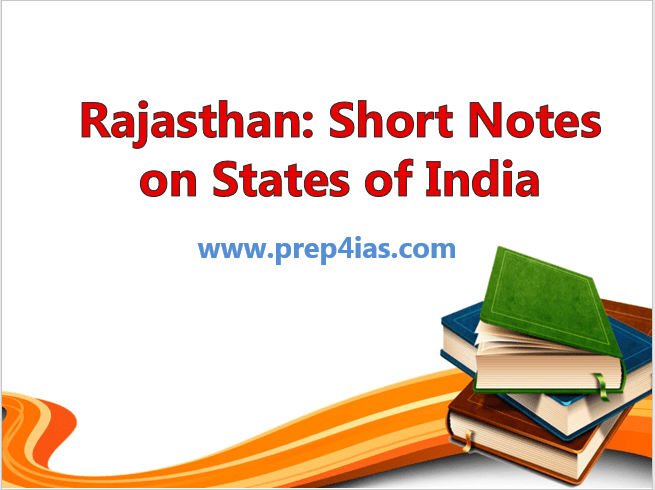In this article, we will look into all important questions related to Rajasthan that can be asked in your exams. Rajasthan is the largest state by area and share its borders with Uttar Pradesh, Haryana, Punjab, Madhya Pradesh and Gujarat. This state is divided into 33 districts and 7 divisions - Jaipur, Jodhpur, Ajmer, Udaipur, Bikaner, Kota and Bharatpur.

Rajasthan: Short notes on States of India
Also Read: Gujarat: Short Notes on States of India - For UPSC/SSC/PSC Aspirants
- Rajasthan is also known as Land of Kings.
- Its capital is Jaipur which is also the largest city of the State.
- State Animal is Camel and State Bird is Great Indian Bustard.
- Rajasthan plains consists of one-third of Great Plains which has huge reserves of Oil and Natural Gas.
- Desert Lands of Thar are mainly Marine deposits.
- Major rivers include Luni, Banas, Mahi, Sabarmati, Banganga and Chambal. Banas is the largest river in Rajasthan.
- Mahi, Sabarmati and Luni drains into Arabian sea whereas Banas, Chambal and Banganga drains into Bay of Bengal.
- Important National Parks are Sariska National Park & Tiger Reserve, Keolado National Park, Ranthambhore National Park and Tiger Reserve, Desert National Park. State does not have any Biosphere reserves.
- Sariska Tiger Reserve is the first tiger reserve which has relocated Tigers successfully.
- Major Lakes include Sambhar Lake, Pushkar Lake, Keolado Lake, Nakki Lake, Panchaprada Lake, Rajsamand Lake and Dhebar Lake.
- Keolado lake is the man made lake.
- Sambhar Lake in India has the highest water salinity.
- Dhebar lake is India's 2nd largest and rajasthan largest fresh water lake.
- Nakki Lake is situated at the Mount Abu hill station in the Aravalli Range.
- South-East Kota, Baran and Jhalawar, Banswara, south-west Udaipur and adjacent areas of Mt. Abu comes under very humid region where average rainfall in rainy season will be around 80 cm to 150 cm.
- Jaisalmer, northern parts of Barmer, western part of Jodhpur and Bikaner, southern parts of Ganganagar district comes under arid region where rainfall is less than 10 cm. Average temperature recorded is around 35 °C in summer and 12 °C to 16 °C in winter.
- Major tribes in rajasthan are Bhils, Minas, Sahariyas, Garasias, Gadiya Lohars. Bhils are the largest tribe and Minhas are the 2nd largest tribe in the State. Minhas are said to be the inhabitant of Indus Valley Civilization.
- Major Folk dance of the state are Ghumar, Kalbeliya, Katputli, Bhopa, Teratali, Chang, Tejaji and Kachchhighori.
- Ghumar is the most popular folk dance of the state. More on State of Rajasthan.
- Major festivals of the state are International Folk Festival, Pushkar Fair, Teej Festival, Gangaur Festival, Nagaur Fair, Urs Festival, Kumbhalgarh Festival.
- Haldighati pass is the mountain pass in the Aravalli Range.
- Aravalli mountains are the oldest fold mountain of the state which extends from Palanpur to Delhi ridge with an average elevation of around 300-800 m.
- Guru Sikhar is the highest point in the Aravalli range with an average elevation of around 1722 m.
- Bhilwara has emerged as India's Largest manufacturer of suiting fabrics and yarn.
- Jaipur is a well-known centre for manufacturing garments, primarily for exports.
- Rajasthan is a major producer of felspar, quartz and bentonite which are the raw materials for ceramic industries.
- State has the second highest number of mines in the Country(557).
- Some of the Important Minerals found in the State are asbestos, barytes, feldspar, fireclay, fluorspar, Iron ore(magnetite and hematite), ochre, pyrite, silver, phosphate fluoride, copper, lead-zinc etc.
